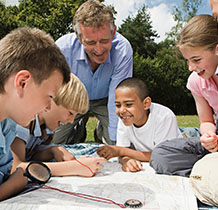Resource Database

Click on a topic or use the search box below to look for a listing:
There are 488 resources. Displaying 10 resources per page.
In the United States, involvement with the juvenile justice system can have a long-lasting negative impact on a person’s life. Afterschool and summer learning programs can mitigate risk and support the development of protective factors that help keep young people out of the juvenile justice system. These programs can also serve as an alternative to detention. This archived webinar from the Afterschool Alliance spotlights afterschool programs that leveraged programming opportunities and partnerships, coordinated efforts to keep young people safe and supported, and helped build protective factors and positive social relationships that led to bright futures.
View Resource
Diverse Learners
The recent national dialogue and policy landscape has exposed children of all ages to complex discussions about immigration, religion, diversity, safety, and community. In a climate of uncertainty, students can end up feeling frustrated, hurt, alienated, or confused if these often-taboo subjects are not confronted thoughtfully by adults. The Afterschool Alliance and a broad range of partners have developed “Tools to Build On,” a webinar series of expert testimony, discussions, resources, and firsthand accounts on how to bring out and build up supportive climates during out-of-school time.
View Resource
Diverse Learners
The well-being of educators is essential to healthy and resilient students. Healthier Generation, through the support of Kaiser Permanente, has developed a four-part on-demand training series with tools and resources to help educators focus on their well-being. Topics include defining and identifying burnout, as well as balancing and combatting it; becoming aware of stress and responses; balance through boundaries; and connecting to your needs. Free registration is required to access the training.
View Resource
Program Management
Remote meetings have become a way of life for both work and socializing. They help us stay in touch but can also be draining. This article from the Harvard Business Review outlines ways that professionals can avoid Zoom fatigue. Strategies include planning breaks, minimizing distractions, and falling back on email and phone calls if needed.
View Resource
Program Management
Educators have faced a multitude of critical decisions about how to implement emergency learning equitably. A new white paper from Harvard University’s Edmund J. Safra Center for Ethics examines some of the ethical decisions that education leaders made as schools transitioned to remote instruction. The paper finds that rather than posing a new set of ethical dilemmas, the pandemic intensifies inequities in the American education system.
View Resource
Program Management
This issue brief from the American Institutes for Research explores how afterschool and summer programs are well positioned to be strong partners in supporting children and families as schools reopen for the summer and 2020–21 school year. The brief focuses on the expanded learning field's ability to provide safe, relationship-rich environments where we can respond to trauma, be trusted partners for families and communities, and provide connections to resources schools and families need. The brief also provides links to frameworks for a whole-child approach as schools reopen and strategies for what expanded learning programs and schools can do to prepare.
View Resource
Program Management
Online learning can enrich instruction and provide educational opportunities, but there are also many challenges. Afterschool Alliance has compiled a series of resources for afterschool programs that are providing virtual instruction. These include case studies from afterschool programs, strategies for reaching underserved youth, privacy considerations, and professional development resources for educators.
View Resource
Technology
Digital citizenship, or the ability to engage in safe and responsible online communication and think critically about online content, is a key skill for youth. Social Media TestDrive lets young people learn and practice digital citizenship skills through a social media simulation. Each TestDrive module teaches a specific social media skill, such as managing privacy settings, smart self-presentation, standing up to cyberbullying, and news literacy. The site also has a guide for educators.
View Resource
Technology
No matter where you are in your grant cycle, having a communication plan to help you collaborate with partners and stakeholders is crucial to the program’s long-term viability. This publication from the National Center on Safe Supportive Learning Environments provides guidance on developing an eight-step communication plan, a strategic roadmap for communication activities, and ways to support the sustainability of successes in your program.
View Resource
Sustainability
The U.S. government’s Youth.gov website has a new toolkit to help youth prepare for postsecondary education and careers. Tools address topics such as evaluating education options, financing education, career exploration, technology, making an education and career plan, and how to learn about existing jobs.
View Resource
There are 488 resources. Displaying 10 items per page.
- Academic Enrichment
- Afterschool Enrichment
- Classroom Management
- College and Career Readiness
- Diverse Learners
- Family and Community Engagement
- Program Management
- Social-Emotional Learning
- Sustainability
- Technology
Subscribe to the Illinois Quality Afterschool newsletter and resource bulletin.
